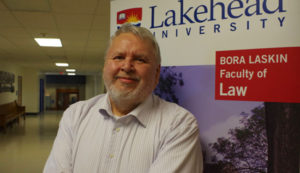First Nations people encouraged to get involved in studying law at Lakehead University

By Rick Garrick
THUNDER BAY–Red Rock Indian Band’s Gilbert Deschamps is looking to get more Indigenous people involved in studying law at Lakehead University’s Bora Laskin Faculty of Law in Thunder Bay.
“I’ve always been interested in academics, in the law, and also in encouraging other Native people to pursue a law degree and a career in law,” says the director of Indigenous relations at the Bora Laskin Faculty of Law. “To me, law opens a lot of doors. You don’t necessarily have to be a barrister in court arguing in front of a judge; you can be a solicitor. Once you have your law degree, the sky is the limit; your imagination is the limit. It gives you that academic rigour on how to analyze things.”
Deschamps graduated from law at the University of British Columbia in 2001 and was called to the bar in Ontario in 2004 after doing his articles with the Indian Claims Commission in Ottawa.
“I didn’t immediately go into the profession of law,” Deschamps says, noting he first worked as a policy analyst with various organizations, including Indian and Northern Affairs Canada and the Assembly of First Nations. “In 2013, I decided to return home to Robinson Superior Treaty territory. So I moved back to Thunder Bay and started practicing on my own at a small practice. And then I was elected to the band council at Red Rock Indian Band.”
Deschamps says his new position with the Bora Laskin Faculty of Law involves recruiting and retaining Indigenous people into the law school as well as coordinating an Aboriginal Perspectives course for all first-year law students.
“We want all of our graduates from law school, Aboriginal and non-aboriginal, to have a good understanding of the Aboriginal community,” Deschamps says, noting that Aboriginal Perspectives is a mandatory course. “So far we’ve brought in Elders; we’ve brought in other lawyers like Evelyn Baxter, who talked about the residential schools.”
Deschamps says the first-year students have attended pow-wows and have the opportunity to create their own experiences with Indigenous people.
“We have three mandates — Aboriginal law, environmental law, and small practice law,” Deschamps says. “The reason why the law school was created is that we need more lawyers in the north.”
Deschamps says many Indigenous people who studied law elsewhere over the years have not returned home after completing their studies.
“They weren’t bringing their knowledge and their skills back to northwestern Ontario,” Deschamps says. “What we are trying to do is to train more Aboriginal people in the area of law, whether it’s criminal law, family law, corporate law.”
Deschamps’ role also includes outreach to post-secondary and high school students.
“I want to see Aboriginal students, even in grade school, start thinking about a career in law,” Deschamps says, noting he didn’t have any exposure to lawyers while he was growing up in his community. “So I want to make the pursuit of law or a career in law a reality for Aboriginal young people.”
Deschamps is also reaching out to older Aboriginal people, including those in the middle of their careers, to encourage them to study law.
“We just graduated one Aboriginal person who started law school at 50, was a grandfather, had worked as a Chief and decided to go back [to school] now that his kids had grown up,” Deschamps says. “He’s practicing law now and he is very successful.”
Deschamps says there are about 3,000 Aboriginal lawyers in Canada, but he only knows of three or four who are practicing law in Thunder Bay and northwestern Ontario.
Deschamps can be reached at: 807-346-7895.

